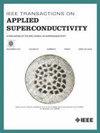Harmonic Suppression Strategy for Dual Three-Phase Permanent Magnet Synchronous Machines Based on a Multi-Input Multi-Output Controller
IF 1.7
3区 物理与天体物理
Q3 ENGINEERING, ELECTRICAL & ELECTRONIC
引用次数: 0
Abstract
To suppress the harmonic components of the phase current of dual three-phase permanent magnet synchronous machines (DTP-PMSMs), an improved control strategy based on the multi-input multi-output (MIMO) proportional resonant (PR) controller is proposed in this paper. The control strategy includes the optimization of the controller and the integration of the voltage feedforward compensation method. By analyzing the traditional vector control strategy based on the vector space decoupling (VSD) coordinate transformation, an equivalent MIMO PR controller with parameter tuning is proposed, which can achieve no static error tracking for the alternating current (AC) signals. The controller considers the decoupling compensation in the traditional vector control strategy, which reduces the complexity of the system. The voltage feedforward compensation path includes the extraction of harmonic currents and the derivation of compensation voltage. By using feedforward compensation for specific harmonic components, more effective suppression of harmonic components can be achieved. Finally, the proposed control strategy was experimentally validated on the experimental platform. Compared with the traditional vector control strategy based on the VSD coordinate transformation, under the proposed control strategy, the total harmonic distortion (THD) content of the machine phase current was reduced by 6.12%, verifying the effectiveness and feasibility of the proposed strategy.基于多输入多输出控制器的双三相永磁同步电机谐波抑制策略
为了抑制双三相永磁同步电机(DTP-PMSM)相电流中的谐波成分,本文提出了一种基于多输入多输出(MIMO)比例谐振(PR)控制器的改进控制策略。该控制策略包括控制器的优化和电压前馈补偿方法的集成。通过分析基于矢量空间解耦 (VSD) 坐标变换的传统矢量控制策略,提出了一种具有参数调整功能的等效 MIMO PR 控制器,可实现对交流 (AC) 信号的无静态误差跟踪。该控制器考虑了传统矢量控制策略中的解耦补偿,从而降低了系统的复杂性。电压前馈补偿路径包括谐波电流的提取和补偿电压的推导。通过对特定谐波分量进行前馈补偿,可以更有效地抑制谐波分量。最后,在实验平台上对所提出的控制策略进行了实验验证。与传统的基于 VSD 坐标变换的矢量控制策略相比,在所提出的控制策略下,机器相电流的总谐波失真(THD)含量降低了 6.12%,验证了所提出策略的有效性和可行性。
本文章由计算机程序翻译,如有差异,请以英文原文为准。
求助全文
约1分钟内获得全文
求助全文
来源期刊

IEEE Transactions on Applied Superconductivity
工程技术-工程:电子与电气
CiteScore
3.50
自引率
33.30%
发文量
650
审稿时长
2.3 months
期刊介绍:
IEEE Transactions on Applied Superconductivity (TAS) contains articles on the applications of superconductivity and other relevant technology. Electronic applications include analog and digital circuits employing thin films and active devices such as Josephson junctions. Large scale applications include magnets for power applications such as motors and generators, for magnetic resonance, for accelerators, and cable applications such as power transmission.
 求助内容:
求助内容: 应助结果提醒方式:
应助结果提醒方式:


